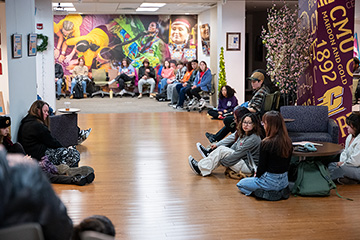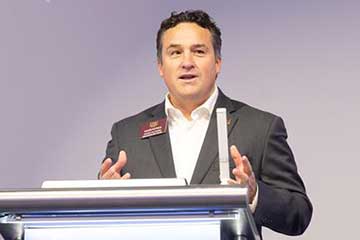How to talk to a conspiracy theorist
Philosophy professor says set rules, accept you might be wrong
Highlights:
- Set guidelines to help create a framework for the conversation.
- Acknowledging that a conspiracy theory might have merit can promote openness and receptiveness.
- It might take days or months for someone to admit that a conspiracy theory is wrong.
Central Michigan University philosophy professor Joshua Smith has a couple of suggestions for talking to people who believe conspiracy theories: approach it collaboratively and prepare to admit that they might be right.

Smith teaches epistemology, the study of the nature and limits of human knowledge. He also teaches a basic logic course. Both brush against the murky nature of conspiracies. Conspiracies can create challenges for talking to people who believe in them. Conspiracies can also make family gatherings like Thanksgiving potential minefields.
Rather than engaging in a contentious argument, Smith suggests that people instead take a purposeful journey together to establish the truth. It’s not easy, but this approach can foster more productive conversations and is less likely to create strained relationships.
A good first step is establishing ground rules, he said. These rules help establish a shared understanding of what constitutes credible evidence and provide a foundation for common ground.
That common ground is important because people have different perspectives on how the world looks. Oftentimes what we think of reality is based on assumption. Everyone has different assumptions.
“Getting the right picture of the world can be really, really hard,” he said.
It is helpful to make an important concession right away. Acknowledge that a conspiracy theory might have merit. That applies no matter how off-base it seems.
“Even for the stuff you really care about, you might be wrong,” he said.
It’s always best to follow the evidence and admit if it’s against your point of view. This gesture can serve as an olive branch of sorts, promoting openness and receptiveness to alternative viewpoints, he said.
Once both people agree to the rules and acknowledge the possibility that either might be right, they can start their journey to establish the truth. That means assessing what evidence is available based on agreed-to sources.
There are two reasons why no matter how strong an argument is that someone may not change their mind immediately. The first is that many people who believe irrational things really want them to be true. Breaking emotional connections to desired outcomes, like conspiracy theories, will take time and patience.
“They need to chew on it for a minute,” he said. It might take them hours or days to conclude they were wrong.
The other reason is simple: They were never really interested in figuring out the truth.
Someone asserting the truth of a conspiracy theory might seek attention, amusement or a familiar role in a family setting. For someone attempting to guide a conspiracy theorist toward reason, it’s important to realize that the individual may simply be unwilling to do so.
If that becomes apparent, it’s time to assess whether it’s fruitful to continue talking, he said. That doesn’t mean it was a waste of time.
“Maybe something good, maybe a moment of reflection comes of it,” he said.




